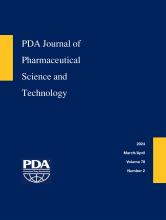Abstract
This session deals with the rational design of viral clearance studies for biopharmaceuticals including recombinant proteins such as monoclonal antibodies and, as new in scope of the symposium, also viral clearance for adeno-associated viral (AAV) vectors. For recombinant proteins, large datasets were accumulated over the last decades and are intended to be used for accelerated product process development and streamlining of viral clearance studies. How to utilize prior knowledge in viral clearance validation and how it can be used in a risk assessment tool to decide whether additional virus clearance studies are necessary during product development is being addressed by three of the presentations of this session. This also includes an a priori intended design and generation of validation data for a new kind of detergent such as CG-110, to build up a platform dataset to be used as prior knowledge in future marketing application. Another presentation investigates the virus removal mechanism of a newly developed hydrophobic interaction chromatography (HIC) resin and demonstrates for highly hydrophobic antibodies appropriate reduction for a retrovirus and impurities in a defined process range in contrast to the moderate to poor virus reduction of recent HIC resins. The last two presentations deal with virus clearance approaches for AAV, which will become mandatory with approval of the ICH Q5A revision. Appropriate virus removal and virus inactivation procedures can be implemented into the manufacturing processes of AAV vectors including viral filtration, viral inactivation (e.g., heat inactivation), affinity chromatography, and anion-exchange chromatography with which it seems possible to achieve a good clearance for helper and also adventitious viruses. The heat treatment step can be even a robust step for adenovirus helper inactivation for AAV products when product characteristics and process conditions are understood.
- Viral clearance (studies)
- Prior knowledge
- Triton CG-110
- Hydrophobic interaction chromatography
- Risk assessment tool
- Adeno-associated viral vectors
- Heat treatment
- Helper virus
- Adenovirus
- © PDA, Inc. 2024
PDA members receive access to all articles published in the current year and previous volume year. Institutional subscribers received access to all content. Log in below to receive access to this article if you are either of these.
If you are neither or you are a PDA member trying to access an article outside of your membership license, then you must purchase access to this article (below). If you do not have a username or password for JPST, you will be required to create an account prior to purchasing.
Full issue PDFs are for PDA members only.
Note to pda.org users
The PDA and PDA bookstore websites (www.pda.org and www.pda.org/bookstore) are separate websites from the PDA JPST website. When you first join PDA, your initial UserID and Password are sent to HighWirePress to create your PDA JPST account. Subsequent UserrID and Password changes required at the PDA websites will not pass on to PDA JPST and vice versa. If you forget your PDA JPST UserID and/or Password, you can request help to retrieve UserID and reset Password below.






